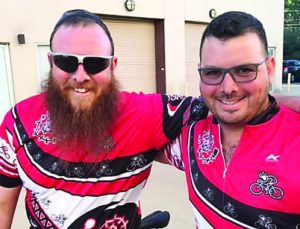By Ariel Domonique Hendelman
One year ago, Rabbi Nochum Kurinsky was running the Chabad House in Ponte Vedra Beach, Fla., with his wife, Leah. He was teaching classes and hosting Shabbat meals for the community with his family.
At 36, Kurinsky was not overly concerned about his health or his own mortality. He had some minor blood-pressure issues, but nothing serious.
But one day while attending a Bar Mitzvah, he began to feel chest pains. “Being at a Bar Mitzvah, there was no shortage of doctors,” Kurinsky told Chabad.org.
“I asked for advice and was told to go to the ER. When I couldn’t drive my car, my wife recognized that I must have been in a lot of pain if I was letting her drive.”
While Kurinsky is able to make jokes about the situation now, he did indeed have a heart attack.
The doctors found that one of his arteries was completely blocked, and they had to operate. Thankfully, there was no tissue damage, and Kurinsky was out of the hospital in a short time. But his life was forever changed. He knew it was time to get serious about his health.
He began going to cardiac rehab at the hospital, as he was advised to do, even though it felt like a waste of time. “It was a really light workout for elderly people. I kept doing it because I was told it was what I needed to do to get healthy,” he said.
At the same time, Kurinsky’s brother, Zach, who lives in Houston, became friendly with Bruce Gilbert, the owner of a bike shop across the street from his warehouse. Gilbert, a former US military special-operations agent, is an accomplished cyclist and trainer with a track record of using cycling to help people who have suffered from cardiac arrest.
Kurinsky asked his cardiologist whether it would be OK for him to go to Houston for a week and train with Gilbert.
“He said it was OK with certain parameters,” recalls Kurinsky. “I couldn’t train too intensely. He agreed that the cardiac rehab is not really designed for young people, although it’s better than nothing.
“Cycling sounded like a lot more fun. Going to the hospital three times a week, I felt like I was still a patient, and it was very depressing. On a bike, you’re outside.
“So I went to Texas last year and we did a cycling boot camp. It was intense. He gave me a whole training. By the time I left, I knew how to ride properly and safely.”
‘A lighthouse, not a tugboat’
Gilbert didn’t just train Kurinsky on a bike; he showed him how to exercise and use his heart rate to monitor the intensity of the workout and stay in the right zone. Kurinsky learned the practice of endurance training.
It became clear to Kurinsky that cycling was going to become a big part of his life, and that this message of “healthy body, healthy soul” was one he wanted to bring to more people.
“My brother and I decided that we wanted to do something really nuts,” said the Florida rabbi. “We wanted a goal — something that was really crazy, and that we were scared of doing.
“We decided that a year from the day that I had the heart attack, we would do this incredible bike ride together. My heart attack motivated him to exercise, too, along with my whole family.
“The concept of the bike ride is that to be healthy and to be able to be a good vessel for serving G-d, you have to be a lighthouse, not a tugboat. We attract others and share our excitement with those around us about being fit. It’s not about having a chiseled body, it’s about being healthy and setting goals to stay that way.”
‘A whole new way to connect to people’
The “Healthy Body, Healthy Soul” bike ride was scheduled to begin June 24 from Chabad of Ponte Vedra Beachand end July 1 in Key West.
The core team consists of Kurinsky, his brother, three other men from Ponte Vedra Beach and a driver.
“Something I’ve learned in chassidus that I hadn’t internalized before, is the concept of self-care. You have to have set times each day to take care of yourself. Saying brachot [blessings] in the morning is not just about serving G-d; it’s about taking time for yourself.
“You’re asking G-d for your needs for the day. I never thought of it that way before. What an amazing message!”
On a communal level, it’s a “whole new way to connect to people,” he said.
“There are people who are interested in biking, running or swimming. They might think rabbis are cool, but they’re not interested in Shabbat. But if they connect with you on a bike, they’ll come to Shabbat.
“I’ve met more people in the last year doing this than I have doing anything else.”

















